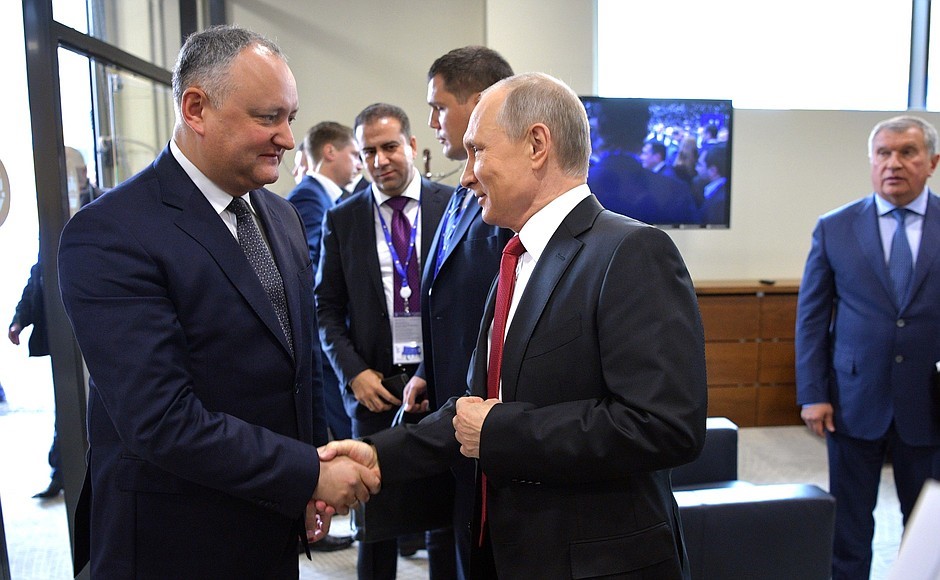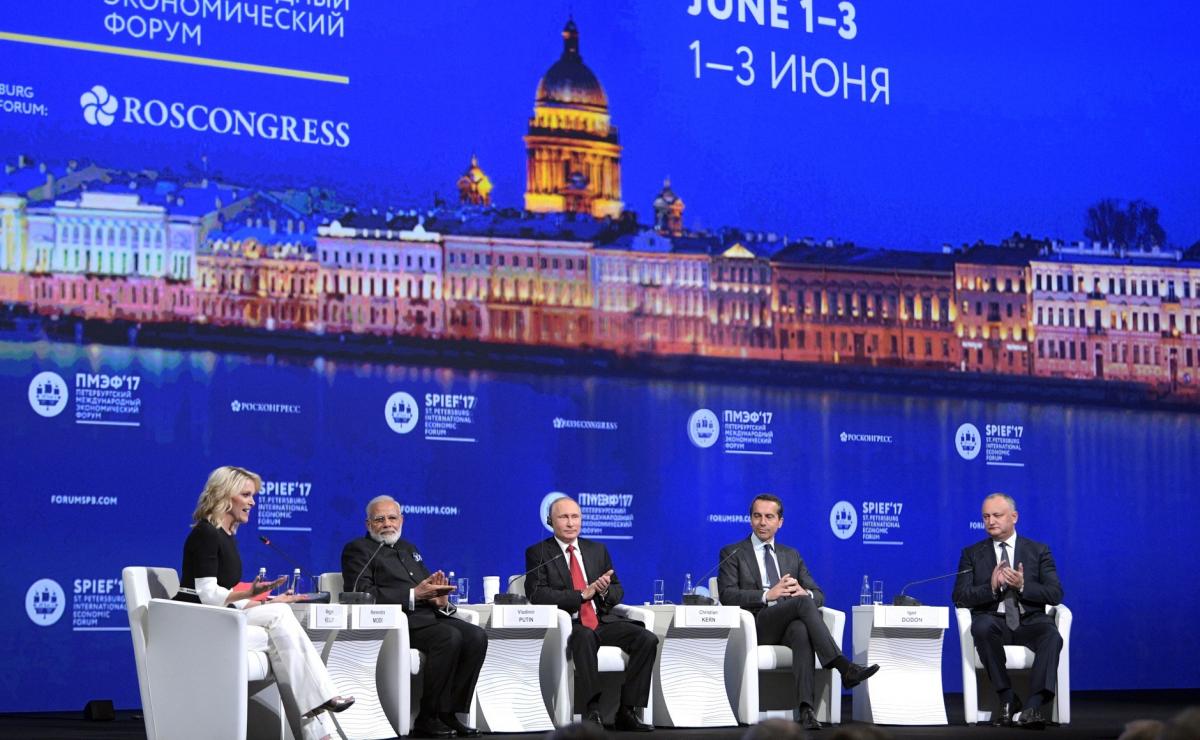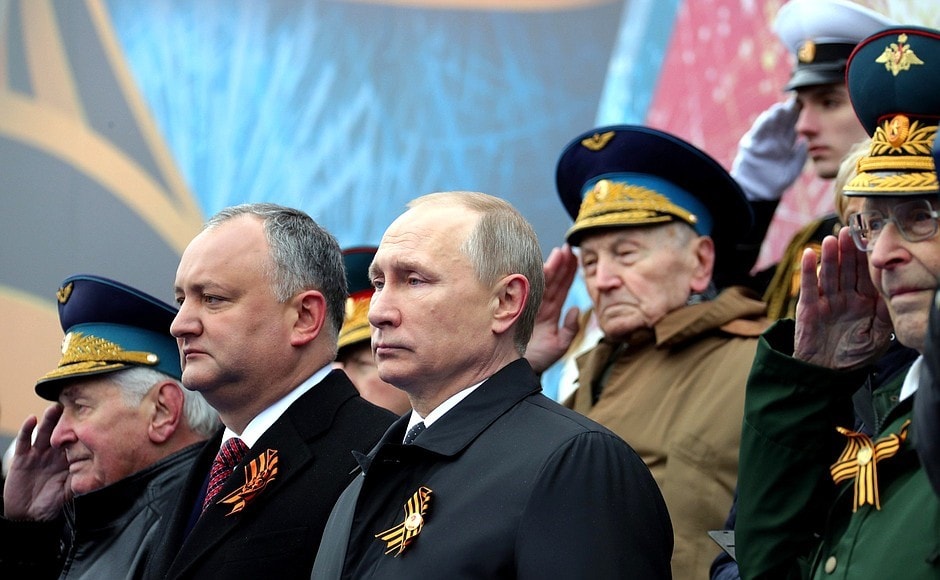On June 2, Moldova's President Igor Dodon took part in the plenary meeting of the 21st St. Petersburg International Economic Forum (SPIEF).[1] In his speech, Dodon emphasized that when Moldova signed the EU Association Agreement, Brussels created asymmetrical conditions in the EU's favor. Hence, he added, that following eight years of Moldova's pursuing pro-European and anti-Russian policies, it was time for a course correction, and Chisinau should return to a strategic dialogue with Russia. This was only natural, argued Dodon, given Moldova and Russia's common past, religion, and traditions.[2]
Dodon was invited to address the forum, immediately after the Moldavan government, formed by the ruling coalition of pro-European parties, expelled five Russian diplomats amidst a crisis with Dodon. The Moldovan President voiced his anger over the decision: "I am deeply outraged by an unfriendly move from representatives of the Moldovan diplomacy and categorically denounce it. This outrageous decision of the government is aimed against moves by the head of state to restore relations with Russia." He then added: "I understand that this was most likely done on orders from the West, maybe even from across the ocean, by those who are worried about a constructive and efficient dialogue between the Moldovan president and the Kremlin."[3]
Russia's Deputy Foreign Minister Grigory Karasin commented: "We will or course think over the reaction [that Russia should take], it will be adequate and rather tough…We unequivocally consider the decision itself as a well-thought-out blow to the policy to bolster relations between Chisinau and Moscow, including the positions of Moldovan President Igor Dodon."[4] Russian Foreign Ministry’s Spokeswoman Maria Zakharova said that Moldova cannot have two contradictory foreign policies. Zakharova said: "Moldova should decide itself what it wants to do… We consider that we deal with a country and a single position of this country on international issues, this practice has existed until recently… Chisinau needs to define its position regardless of where and what steps of the kind are taken. As usual, adequate, tit-for-tat and symmetric measures are taken in response."[5]
Recently, Reuters published a news story revealing that the five Russian diplomats expelled from Moldova were believed to be spies, recruiting fighters for the Moscow-backed insurgency in Ukraine.[6] However, Russian Deputy Foreign Minister Karasin said that this news is "absolutely empty talk", "not supported by any facts."[7]
Soon after the expulsion of the five Russian diplomats, Prime Minister Pavel Filip declared that the decision was taken on the basis of "clear elements," assuring that these elements are related to "state security."[8]
Below are excerpts from
Dodon's speech at the SPIEF:[9]
Moldova's President Dodon (Source: Presedinte.md)

Putin's Meeting with Dodon at the SPIEF. (Source: Kremlin.ru)

St Petersburg International Economic Forum plenary meeting. (Source: Kremlin.ru)
Dodon: 'The Unipolar World Has Been Replaced By The Multipolar One'
"What are the principal challenges that we face now? What is important for us? What can we expect in the foreseeable future? These questions concern us all, regardless of the size of our countries' economies or their potential. In my view, there are several fundamental points we should keep in mind.
"The world has ceased to be unipolar, and therefore the principles of globalization must become a thing of the past. The unipolar world has been replaced by the multipolar one. Globalization is being replaced by glocalization, which leads to the strengthening of specific features of peoples, countries and social systems. In practice, this means that the unified rules and standards developed in one country can no longer be forced on the rest of the world.
"We will be better off carrying out a major renovation. We all have finally realized that we are different, we have different customs, different value systems, and the artificial imposition of foreign principles and laws will not lead to any good. Confucius used to say: 'Having diverging paths, you do not make common plans'. Each region, each country has its own historical path -- whether in the past or in the future -- and they cannot be reduced to a set of common rules and standards.
"The Republic of Moldova is a case in point. We face the same situation. In 2014, in accordance with the principles of globalization, the Republic of Moldova signed a very one-sided European Union Association Agreement and created a free trade zone. The conditions we created were very much favorable to EU businesses.
"We were promised a land flowing with milk and honey. But now, three years later, here is the result: in 2014-2016 we lost two-thirds of exports to Russia, investments have shrunk two to three times, and corruption is way up. As they say, 'It was smooth on paper, but we've forgotten about ravines [L. Tosltoy].'
"And after eight years of pro-European and explicitly anti-Russian policy, this year we have begun to remedy the situation: we have returned to a strategic dialogue with our Russian partners, economic cooperation has resumed. For the first quarter of this year, we achieved a 42 percent increase in exports. The export of apples grew sevenfold, export of wines grew fivefold. We have begun to address the issue of migrants and have signed an agreement with the EAEU [Eurasian Economic Union].
Dodon: Russia And Moldova Share A Common Past And A Common Faith

Dodon with Putin on Victory Day, May 9, 2017 (Source: Kremlin.ru)
"Recalling the saying of Confucius, we have started building common plans, because we have the same path as well as the common past (our diplomatic relations date back to the end of the 15th century) and the common centuries-old history (and we share [the man of letters and statesman] Dimitrie Cantemir, who was the closest adviser to Peter the Great, the founder of this wonderful, magnificent city). We share the Orthodox faith: 98 percent of Moldovan citizens are Orthodox Christians, and the Moldovan Orthodox Church is a branch of the Russian Orthodox Church. Of course, some do not like it, thus we have seen provocations: diplomatic scandals, the expulsion of diplomats. Everyone understands what they are trying to achieve: to provoke a new rupture between our countries and to harm the president of Moldova. I am sure, however, that we will overcome all that. We will keep protecting our interests and enhancing the strategic partnership. It is crucially important for us to strengthen our statehood, to unite the country, to get away from globalization that has no place for Moldova: we will simply be wiped out -- our economy, our traditions and our faith. At the same time it is important for us to take a step towards glocalization in order to join regional associations with countries that have a common past with us.
"The recent bitter experience of the Republic of Moldova makes us revisit a concept that has long been on the periphery of global economic trends, and which deserves to be revived. I mean the idea of a sovereign economy.
"We will be building our country, our future, based on our national interests, the interests of our citizens and our businesses.
"We will trade and make friends with both the West and the East, but not partner up with someone against someone else. Moldova should not and will not build relationships with those who seek to impose on us something that is alien to us. Come visit us, we are a hospitable people, but don't force us to accept your laws and values. We are ready to be friends and to do business, but as equals, and not as lord and vassal.
"In conclusion, I would like to appeal to all those who still see the future of their country and their people through the rose-colored glasses of the unipolar world of globalization. Come to your senses and stop being pawns in geopolitical chess battles. Don't let yourself be used as cannon fodder by someone solving their geopolitical problems. Recall Confucius when you make plans for the future.
"Thank you for your attention!"
[1] See MEMRI Special Dispatch No. 6955, St. Petersburg International Economic Forum Plenary Meeting, June 11, 2017.
[2] See MEMRI Special Dispatch No. 6756, Russia's Orbit – Moldova's President Dodon Promotes Strategic Partnership With Russia During Visit To Moscow, January 31, 2017.
See MEMRI Special Dispatch No. 6696, Russia's Orbit - Part III - The New Pro-Russian President Of Moldova, November 29, 2016.
[3] Tass.com, May 29, 2017.
[4] Tass.com, May 29, 2017.
[5] Tass.com, May 31, 2017.
[6] See Exclusive: Russian diplomats expelled from Moldova recruited fighters - sources, June 13, 2017.
[7] Sputniknews.com, June 13, 2017.
[8] Adevarul.ro, May 31, 2017.
[9] Presedinte.md, June 2, 2017.






